Of Pharaohs, Ancient Medicine, and Mighty Gods || Review [Eng/Esp]
Sometimes we do not choose books, but rather books choose us and, what's more, they even define our destiny. This is what happened to me with Sinuhe the Egyptian, by Finnish author Mika Waltari, one of the most important historical novels of the 20th century.
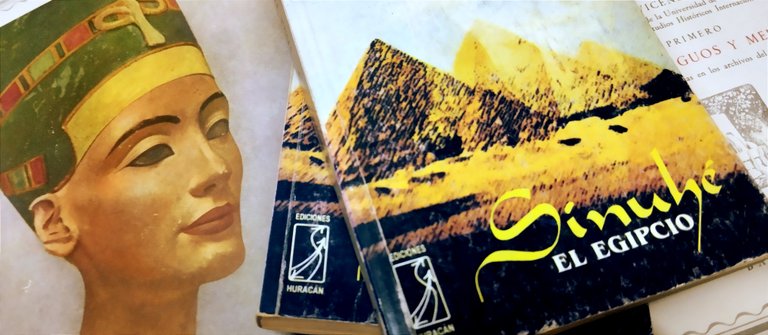
This novel transports us to Ancient Egypt during the reign of the unique Akhenaten, a period of great political and religious changes, and this entire journey unfolds through the eyes of Sinuhe, who happens to be none other than the royal physician. Written as this character's memoirs during his old age and exile, it recounts his life from birth abandoned as a child on the Nile to becoming a physician thanks to his intelligence and dedication.
Sinuhe, an intelligent yet arrogant character, compassionate yet selfish, though he achieves wealth and prestige, his life is marked by loneliness and regret, also revealing himself as a man victimized by desire and fascination for a woman who leads him to destruction.
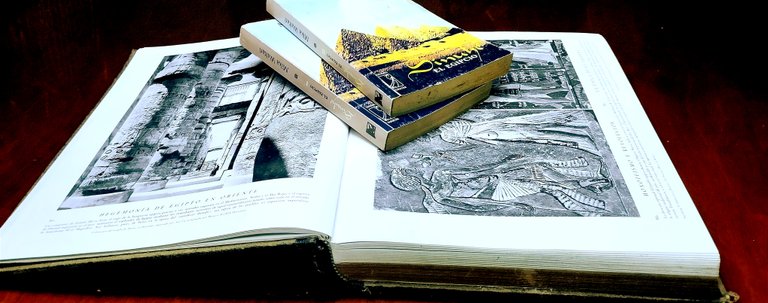
One of the central themes of this book that also brings us closer to one of the most unique moments in Egypt's history was Sinuhe's relationship with Akhenaten's reign, the heretic pharaoh who tried to impose monotheism in an Egypt full of gods, and in this work Mika Waltari explores this bold religious experiment, its political consequences and impact on Egyptian society.
Akhenaten proclaimed that Aten (the solar disk) was the only true deity, thus eliminating worship of Amun-Ra, Osiris, Isis and other gods of the Egyptian pantheon, leading to not just theological but political reform as temples were closed, a new capital declared, and art abandoned traditional rigidity, showing the pharaoh and his family in intimate scenes under Aten's rays.
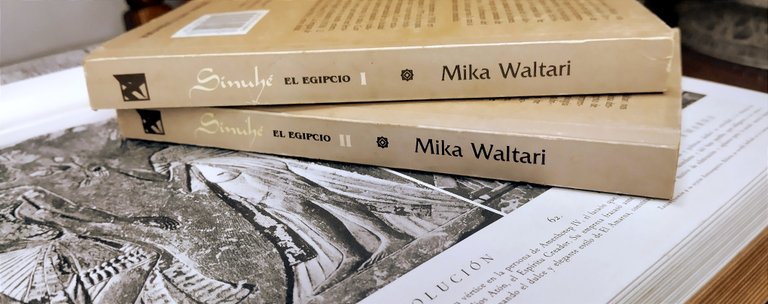
In the novel, Sinuhe describes how all this created chaos and resistance among people accustomed to praying to multiple gods for their harvests, health or simply their protection. Throughout the work, this pharaoh is seen as a fanatical visionary who "believed he could change men's hearts with a decree."
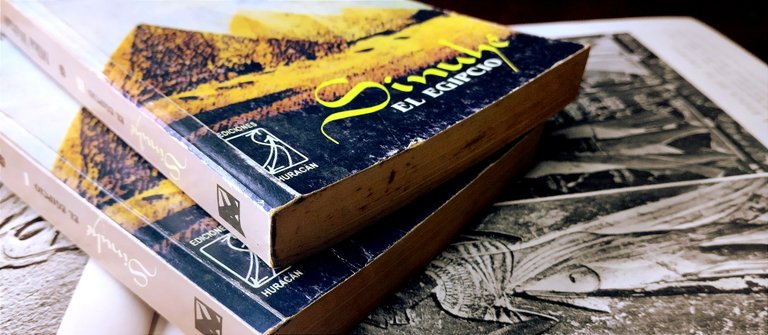
But nothing impressed me more than Sinuhe's dedication to medicine. The book displays detailed descriptions of medical practices of the time, especially surgical interventions like trepanation, which the protagonist performs several times in the novel. This technique, which involves drilling the skull to relieve pressure or treat trauma, I was able to perform just a few years after reading this novel, while working as a neurosurgery assistant throughout my medical studies, and believe me, I remembered Sinuhe the entire time.
Sinuhe describes how he learned and practiced trepanation, emphasizing its precision and risks while using bronze instruments, analgesic herbs like opium, and suturing techniques. It shows the surprising advancement of science at the time, though patients still die and infections are common.
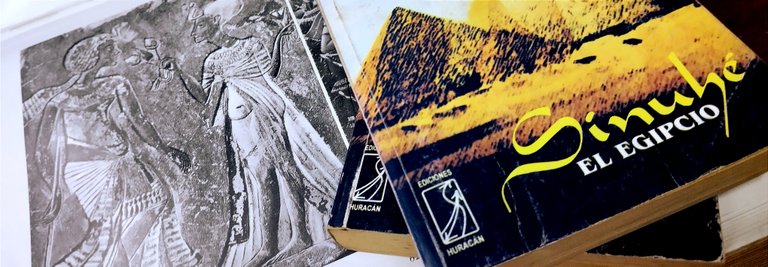
Waltari researched deeply to write this novel, evident in details about medicine, politics and daily life in Ancient Egypt; however, what's most impressive is how he makes a story from over 3000 years ago feel so human and current.
Sinuhe the Egyptian is one of those books that leaves a mark. I read it long ago, but I still remember complete scenes. It's not a cheerful book, but its honesty is what makes it great, because Waltari doesn't idealize the past; he shows cruelty, injustice and human stupidity with a merciless gaze, making it one of the best historical novels ever written.
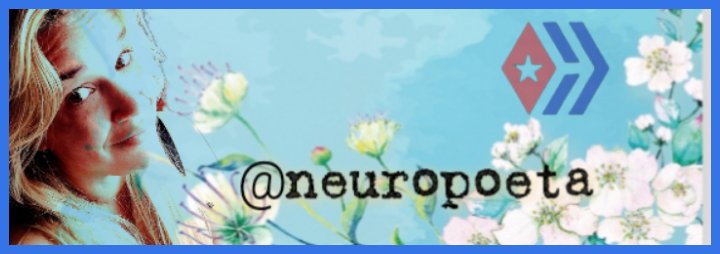
✨ 𝑻𝒉𝒂𝒏𝒌𝒔 𝒇𝒐𝒓 𝒓𝒆𝒂𝒅𝒊𝒏𝒈! ✨
𝑰𝒇 𝒚𝒐𝒖 𝒅𝒐𝒏’𝒕 𝒌𝒏𝒐𝒘 𝒎𝒆 𝒚𝒆𝒕—𝑰’𝒎 𝒂 𝑪𝒖𝒃𝒂𝒏 𝒏𝒆𝒖𝒓𝒐𝒍𝒐𝒈𝒊𝒔𝒕 𝒂𝒏𝒅 𝒘𝒓𝒊𝒕𝒆𝒓, 𝒂 𝒎𝒐𝒕𝒉𝒆𝒓, 𝒂 𝒘𝒐𝒎𝒂𝒏, 𝒂𝒏𝒅 𝒂 𝒅𝒓𝒆𝒂𝒎𝒆𝒓 𝒘𝒉𝒐’𝒔 𝒇𝒐𝒖𝒏𝒅 𝒊𝒏 𝑯𝒊𝒗𝒆 𝒂 𝒃𝒆𝒂𝒖𝒕𝒊𝒇𝒖𝒍 𝒔𝒑𝒂𝒄𝒆 𝒕𝒐 𝒔𝒐𝒂𝒓.
𝑨𝒍𝒍 𝒕𝒆𝒙𝒕 𝒂𝒏𝒅 𝒊𝒎𝒂𝒈𝒆𝒔 𝒂𝒓𝒆 𝒎𝒚 𝒐𝒓𝒊𝒈𝒊𝒏𝒂𝒍 𝒄𝒓𝒆𝒂𝒕𝒊𝒐𝒏𝒔, 100% 𝒉𝒖𝒎𝒂𝒏-𝒎𝒂𝒅𝒆 (𝒏𝒐 𝑨𝑰).
𝑩𝒂𝒏𝒏𝒆𝒓 𝒅𝒆𝒔𝒊𝒈𝒏𝒆𝒅 𝒃𝒚 𝑳𝒖𝒎𝒊𝒊.
𝑳𝒐𝒗𝒆𝒅 𝒕𝒉𝒊𝒔 𝒑𝒐𝒔𝒕? 𝑼𝒑𝒗𝒐𝒕𝒆, 𝒄𝒐𝒎𝒎𝒆𝒏𝒕, 𝒐𝒓 𝒓𝒆𝒃𝒍𝒐𝒈 𝒕𝒐 𝒔𝒑𝒓𝒆𝒂𝒅 𝒕𝒉𝒆 𝒘𝒊𝒏𝒈𝒔 𝒐𝒇 𝒄𝒓𝒆𝒂𝒕𝒊𝒗𝒊𝒕𝒚! 💛

VERSIÓN EN ESPAÑOL

De faraones, medicina antigua y grandes dioses || Reseña
En ocasiones nosotros no escogemos a los libros, sino que los libros nos escogen a nosotros y, es más, incluso definen nuestro destino. Así me sucedió con Sinuhé, el egipcio, del finlandés Mika Waltari, una de las novelas históricas más importantes del siglo XX.

Esta novela nos transporta al Antiguo Egipto, durante el reinado del singular Akenatón, un periodo en el que se experimentaron muchos cambios políticos y religiosos, y todo este viaje se hace a través de los ojos de Sinuhé, quien resulta ser, nada más y nada menos, que el médico real. Escrita a manera de memorias de este personaje, cuando ya es anciano y exiliado, relata su vida desde el nacimiento, abandonado de niño en el Nilo y devenido médico gracias a su inteligencia y dedicación.
Sinuhé, un personaje inteligente pero arrogante, compasivo pero egoísta, aunque logra riqueza y prestigio, su vida está marcada por la soledad y el arrepentimiento, que también se descubre como un hombre víctima del deseo y la fascinación hacia una mujer que lo lleva a la destrucción.

Uno de los temas centrales de este libro y que además nos acerca a uno de los momentos más singulares de la historia de Egipto, fue la relación de Sinuhé con el reinado de Akenatón, el faraón hereje que intentó imponer el monoteísmo en un Egipto lleno de dioses, y en esta ocasión Mika Waltari explora este audaz experimento religioso, sus consecuencias políticas e impacto en la sociedad egipcia.
Akenatón proclamó que Atón (el disco solar) era la única deidad verdadera, eliminando así el culto a Amón-Ra, Osiris, Isis y los demás dioses del panteón egipcio, llevando a una reforma además de teológica, política, ya que se cerraron templos, se declaró una nueva capital y el arte abandonó la rigidez tradicional, mostrando al faraón y su familia en escenas íntimas bajo los rayos de Atón.

En la novela, Sinuhé describe cómo todo esto creó caos y resistencia en un pueblo acostumbrado a rezar a múltiples dioses para sus cosechas, salud o simplemente para su protección. En toda la obra se ve a este faraón como un visionario fanático que "creía que podía cambiar el corazón de los hombres con un decreto".

Pero nada de esto fue más impresionante para mí que la dedicación de Sinuhé a la medicina. El libro exhibe una detallada descripción de las prácticas médicas de la época, especialmente las intervenciones quirúrgicas como la trepanación, que el protagonista varias veces practica en la novela. Esta técnica, que consiste en perforar el cráneo para aliviar presión o tratar traumatismos, la pude realizar solo pocos años después de leer esta novela, al ser alumna ayudante de Neurocirugía durante toda mi carrera de Medicina, y créanme que todo el tiempo recordaba a Sinuhé.
Sinuhé describe cómo aprendió y practicó la trepanación, destacando su precisión y los riesgos que implicaba, mientras utilizaba instrumentos de bronce, hierbas analgésicas como el opio y técnicas de sutura. Se muestra lo sorprendente de la avanzada ciencia de la época, aunque los pacientes también mueren y las infecciones son comunes.

Waltari investigó profundamente para escribir esta novela, y eso se nota en los detalles sobre medicina, política y vida cotidiana en el Antiguo Egipto; sin embargo, lo más impresionante es cómo logra que una historia de hace más de 3000 años se sienta tan humana y actual.
Sinuhé, el egipcio es uno de esos libros que dejan huella. Lo leí hace mucho, pero todavía recuerdo escenas completas. No es un libro alegre, pero su honestidad es lo que lo hace grande, porque Waltari no idealiza el pasado; muestra la crueldad, la injusticia y la estupidez humana con una mirada despiadada, que lo convierte en una de las mejores novelas históricas jamás escritas.

✨ ¡𝑮𝒓𝒂𝒄𝒊𝒂𝒔 𝒑𝒐𝒓 𝒍𝒆𝒆𝒓! ✨
𝑺𝒊 𝒂ú𝒏 𝒏𝒐 𝒎𝒆 𝒄𝒐𝒏𝒐𝒄𝒆𝒔: 𝒔𝒐𝒚 𝒏𝒆𝒖𝒓ó𝒍𝒐𝒈𝒂 𝒚 𝒆𝒔𝒄𝒓𝒊𝒕𝒐𝒓𝒂 𝒄𝒖𝒃𝒂𝒏𝒂, 𝒎𝒂𝒅𝒓𝒆, 𝒎𝒖𝒋𝒆𝒓 𝒚 𝒔𝒐ñ𝒂𝒅𝒐𝒓𝒂 𝒒𝒖𝒆 𝒆𝒏𝒄𝒐𝒏𝒕𝒓ó 𝒆𝒏 𝑯𝒊𝒗𝒆 𝒖𝒏 𝒉𝒆𝒓𝒎𝒐𝒔𝒐 𝒆𝒔𝒑𝒂𝒄𝒊𝒐 𝒑𝒂𝒓𝒂 𝒗𝒐𝒍𝒂𝒓.
𝑬𝒍 𝒕𝒆𝒙𝒕𝒐 𝒚 𝒍𝒂𝒔 𝒊𝒎á𝒈𝒆𝒏𝒆𝒔 𝒔𝒐𝒏 𝒅𝒆 𝒎𝒊 𝒂𝒖𝒕𝒐𝒓í𝒂, 100% 𝒉𝒖𝒎𝒂𝒏𝒐𝒔 (𝒔𝒊𝒏 𝑰𝑨).
𝑩𝒂𝒏𝒏𝒆𝒓 𝒅𝒊𝒔𝒆ñ𝒂𝒅𝒐 𝒑𝒐𝒓 𝑳𝒖𝒎𝒊𝒊.
¿𝑻𝒆 𝒈𝒖𝒔𝒕ó 𝒆𝒔𝒕𝒂 𝒑𝒖𝒃𝒍𝒊𝒄𝒂𝒄𝒊ó𝒏? 𝑽𝒐𝒕𝒂, 𝒄𝒐𝒎𝒆𝒏𝒕𝒂 𝒐 𝒓𝒆𝒃𝒍𝒐𝒈𝒖𝒆𝒂 𝒑𝒂𝒓𝒂 𝒂𝒚𝒖𝒅𝒂𝒓 𝒂 𝒅𝒆𝒔𝒑𝒍𝒆𝒈𝒂𝒓 𝒆𝒔𝒕𝒂𝒔 𝒂𝒍𝒂𝒔. 💛
No tengo el gusto de haberlo leído pero por lo que expresas en tu reseña,es un libro profundo que vale la pena leer.
Has sido votado por
PROYECTO ENLACE
'Conectando Ideas y Comunidades'
PROYECTO ENLACE es un proyecto de curación de habla hispana enfocado en recompensar contenido de calidad y apoyar autores en su proceso de crecimiento en HIVE.
Creemos y apostamos por el futuro de esta gran plataforma, y estamos muy emocionados de poder hacerla crecer junto a esta comunidad. Así que te invitamos a publicar en nuestra COMUNIDAD y estar atento a todas las actividades que tenemos preparadas y que estaremos publicando en breve.
¿QUIERES AUTOMATIZAR TUS GANANCIAS DE CURACIÓN? SE PARTE DEL PROYECTO ENLACE APOYANDO A NUESTRO TRAIL EN HIVE.VOTE INGRESA AQUÍ PARA CONOCER LOS DETALLES.
¿QUIERES INVERTIR ENLACE? DESCUBRE COMO HACERLO Y GENERAR INGRESOS DE FORMA SEMANAL MEDIANTE TU DELEGACIÓN DE HP AQUÍ TE EXPLICAMOS COMO.
Te invitamos a participar en nuestro servidor de Discord: https://discord.gg/3S9y7BbWfS
Atentamente
EQUIPO ENLACE 2025
This is actually a memorable book. I enjoyed reading the review.
Excelente reseña @neuropoeta.
¡Qué interesante tu reseña Yadi! Abrazos y un lindo día para tí.
Niña, oro molido tienes allí 🥰
Hermoso, Sinué el egipcio, resultó para mí una lectura apasionante. Además de que me siempre me han apasionado esos temas está muy bien escrito y presentado como dices desde una perspectiva tanto médica como histórica, religiosa y política. Enriquecedor
The combination of Sinuh's love of medicine and your real-life experience is truly remarkable. Best wishes to you.
Gracias por acercarnos a esta obra
Que recordatorio tan importante, una parte histórica, una parte medicinal. Nos ubica en una época muy antigua. es inicio de una medicina muy rustica. Un abrazo.
!LADY
!BBH
View or trade
LOHtokens.@sacra97, you successfully shared 0.1000 LOH with @neuropoeta and you earned 0.1000 LOH as tips. (4/14 calls)
Use !LADY command to share LOH! More details available in this post.
From Venezuela, our witness drives decentralization and the adoption of Web3 technology, creating opportunities for the local community and contributing to the global ecosystem. // Desde Venezuela, nuestro testigo impulsa la descentralización y la adopción de la tecnología Web3, generando oportunidades para la comunidad local y contribuyendo al ecosistema global.
Sigue, contacta y se parte del testigo en: // Follow, contact and be part of the witness in:
Uno de los primeros libros que leí en mi adolescencia y que ahora, al disfrutar de tu excelsa reseña debo retomar nuevamente.
¡Gracias!